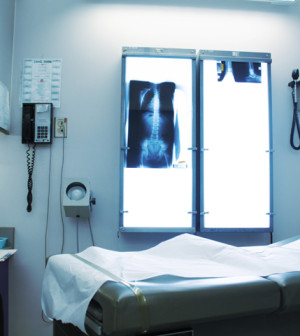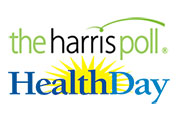- Could Your Grocery Store Meat Be Causing Recurring UTIs?
- Are You Making This Expensive Thermostat Error This Winter?
- Recognizing the Signs of Hypothyroidism
- 10 Strategies to Overcome Insomnia
- Could Artificial Sweeteners Be Aging the Brain Faster?
- Techniques for Soothing Your Nervous System
- Does the Water in Your House Smell Funny? Here’s Why
- Can a Daily Dose of Apple Cider Vinegar Actually Aid Weight Loss?
- 6 Health Beverages That Can Actually Spike Your Blood Sugar
- Treatment Options for Social Anxiety Disorder
Americans Increasingly Anxious About Ebola: Poll


One-quarter of Americans now view Ebola as a major public health threat to the United States, with many saying they’d change their travel plans due to Ebola fears, a new Harris Poll/HealthDay survey reveals.
The online poll of more than 2,000 adults, taken between Oct. 2 and 6, finds the number of people seriously concerned about Ebola surging in recent weeks.
The number of people who consider Ebola a “major threat” to the United States jumped from 13 percent in mid-September — before the nation’s first diagnosed case of Ebola appeared in Dallas on Sept. 28 — to 27 percent during polling earlier this week.
The Dallas patient, Thomas Eric Duncan, a Liberian national, died Wednesday from the disease.
The public’s rising concern over Ebola is understandable, said Mayo Clinic infectious diseases physician and researcher Dr. Pritish Tosh.
“Ebola is an agent that evokes a lot of fear, and can result in societal disruption,” Tosh said. “There’s a reason why it’s considered a possible bioterrorism agent. So any time you have any cases in the United States, there is a heightened amount of anxiety.”
But he added that much of the fear is unwarranted, given that Ebola does not spread easily and the United States has advanced health care and public health systems in place to deal with potential outbreaks.
Still, the Ebola crisis in Africa prompted the director of the U.S. Centers for Disease Control and Prevention, Dr. Tom Frieden, to state Thursday: “In my 30 years in public health, the only thing that has been like this is AIDS. We have to work now so that this is not the world’s next AIDS.”
In the poll, about one out of four people who had holiday or business travel plans said they now plan to cancel or cut back on that travel, due to concerns about Ebola.
Tosh said he traveled by air himself without concern on Tuesday, flying from Minnesota to Philadelphia so he could attend an infectious diseases conference.
“Ebola shouldn’t be the reason people aren’t seeing their family for Thanksgiving,” he said.
Overall, the survey found that 55 percent of people now view Ebola as some level of public health threat to the United States, up 15 percentage points from the mid-September survey. That’s more than are worried about widespread illnesses such as hepatitis C (49 percent) or West Nile virus (45 percent).
Poll respondents also came out strongly in favor of increased screening of new arrivals to America from the West African nations of Liberia, Guinea and Sierra Leone, the main countries affected by the Ebola outbreak.
Nine out of 10 people said they agree with screening of people entering the country from those nations, and two-thirds said they agree strongly.
On Wednesday, U.S. authorities announced that five major international airports — JFK International Airport in New York City, Washington Dulles International, O’Hare International in Chicago, Hartsfield-Jackson International in Atlanta and Newark Liberty International in New Jersey — would begin Ebola screening for passengers arriving from the three affected West African nations.
“As the Ebola epidemic in West Africa continues to grow very rapidly, and the first American Ebola victims are being treated in this country, there is overwhelming support for strict screening of all new arrivals from the countries affected,” said Humphrey Taylor, chairman of The Harris Poll.
However, there were also signs in the poll that concern over Ebola has not yet spilled over into outright panic. More than four out of five respondents told the pollsters they don’t plan to make any changes in their daily routine because of the outbreak, and three-quarters said they’re still more worried about catching the flu than Ebola.
Of course, that could change if any of the people who came into contact with Duncan contract Ebola themselves, Taylor noted.
The public’s anxiety may also be amplified by a lack of understanding about the virus.
For example, three out of four of those polled said they are concerned that people carrying Ebola will infect others before showing symptoms themselves.
But that simply can’t happen, according to both Tosh and the U.S. Centers for Disease Control and Prevention.
Ebola can only be transmitted by people who have fallen ill and are already showing symptoms — and even then only if a healthy person comes into contact with the body fluids of a sick person, Tosh said.
He believes the situation in West Africa is dire because people don’t have proper sanitation or access to either health care or funeral services, which puts them in direct contact with the blood, vomit, feces and other excretions of both living and dead Ebola patients.
“The situation in West Africa that has allowed the outbreak to continue is very different than what is happening in the United States,” Tosh said.
According to the World Health Organization, over 8,000 cases of Ebola have now been reported in West Africa, and almost 3,900 people have died.
More information
For more on Ebola, head to the U.S. Centers for Disease Control and Prevention.
Source: HealthDay
Copyright © 2026 HealthDay. All rights reserved.










